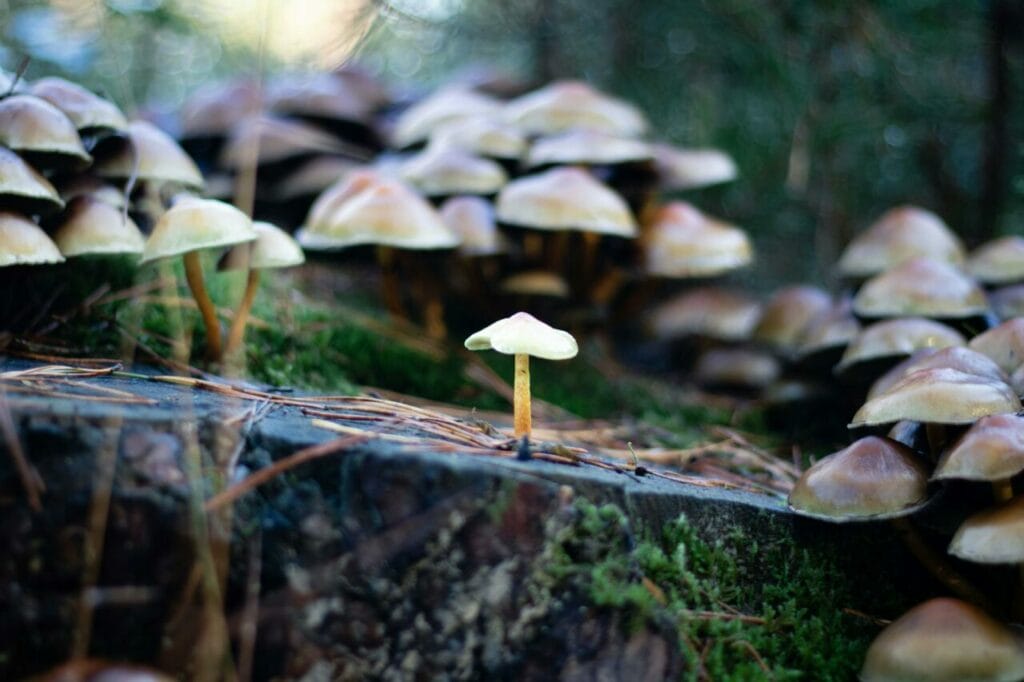Alzheimer’s Disease (AD) is a progressive neurodegenerative disorder for which there is no known cure. The increasing incidence of this disease presents a significant challenge. Researchers are investigating advanced treatment strategies by studying both natural and synthetic alternatives.
Many clinical trials have highlighted the promising potential of serotonergic psychedelics such as LSD, DMT, and psilocybin, in the treatment of Alzheimer’s disease. To delve deeper into this fascinating subject, you are invited to explore online resources or consider “purchasing psychedelics online in Canada.”
[toc]
The Significance of Psychedelics in Alzheimer’s Treatment
Conventional psychedelics exhibit potential in treating early-stage Alzheimer’s Disease (AD) or mild cognitive impairment (MCI) by stimulating brain cell growth.
Psychedelics may foster neural plasticity for learning and memory by engaging specific brain receptors. This could potentially decelerate or even counteract the neurodegenerative effects of AD. Furthermore, psychedelics might mitigate depression and anxiety, commonly experienced by AD patients, by initiating positive psychological impacts.
There are still uncertainties about how psychedelic treatments function. Some suggest that profound effects from high-dose psychedelics, such as mystical sensations or a sense of self-dissolution, are essential for reaping psychological benefits. Others argue that the key lies in the biological changes triggered by these substances. Both viewpoints may be valid.
Traditional psychedelics appear to aid the brain in adapting and reducing inflammation, even at lower doses. Therefore, low-dose treatments might be beneficial for issues like brain degeneration or migraines without substantial mind-altering effects. However, for conditions like depression, anxiety, or addiction, the mind-altering effects seem to be crucial, leading to introspection and behavioural changes. Hence, both low and high doses warrant investigation for tailored therapy.
The Impact of Serotonergic Psychedelics
Serotonergic psychedelics, including LSD (lysergic acid diethylamide), DMT (dimethyltryptamine), and psilocybin (found in magic mushrooms), are garnering
There is growing interest in the potential therapeutic effects of psychedelics on a range of mental health disorders.
Experts in the field are particularly intrigued by the role of serotonin receptors in Alzheimer’s Disease (AD) research. Known for their capacity to boost cognition and alter neuroplasticity, these receptors offer a promising avenue for exploration.
Psychedelics primarily exert their pharmacological effects by modifying the brain’s serotonin system. This adjustment leads to changes in perception, mood, and awareness. A number of studies have provided supporting evidence for this idea:
- In particular, the 5-HT2A subtype of serotonin receptors influences the gene expression of neuroplasticity-enhancing neurotrophins in brain areas affected by AD.
- These receptors also regulate cortical signalling, a crucial process for cognition, memory, and synaptic plasticity.
- Despite their unique distribution within neurons, serotonin receptors play a significant role in neural development, regeneration, and plasticity.
Significant Research Findings
- Studies suggest that serotonergic psychedelics may help ameliorate aspects of AD pathology by promoting neuroplasticity.
- Classic psychedelics have been found to influence neurotransmission, stimulate synaptic remodelling, and increase factors that aid neuronal survival.
- Specific psychedelics, such as muscimol and Sig-1R agonists, may help reduce the neurotoxicity associated with the progression of AD.
- Classic psychedelics activate pathways in brain regions impacted by AD, suggesting they may potentially slow down or reverse brain degeneration.
- Psilocybin mushrooms have been found to stimulate neural plasticity, promote neurogenesis, and create lasting modifications in brain circuits.
- Psychedelics may enhance brain connectivity by targeting receptor genes and initiating changes in neurons and networks.
Clinical research shows that both classic and non-classic psychedelics from magic mushrooms can induce rapid changes in gene expression and cause significant transformations in brain structure and function.
By interacting with receptors like serotonin, sigma, NMDA, and GABA, these psychedelics can improve synaptic plasticity and rejuvenate the brain. Consequently, they may positively impact behaviour, memory, and cognition, positioning them as potential therapeutic options for treating AD and similar disorders.
Acquire Psychedelics Online in Canada
Considering microdosing magic mushrooms?
Explore our online store where you’ll find a vast selection of psychedelic products in British Columbia, Canada. We suggest starting your exploration with a reputable medicinal mushroom dispensary.
- LSD
LSD is a synthetic drug derived from a fungus called ergot present on rye grains. This psychoactive compound can alter thoughts, emotions, and perceptions, even at low doses.
Excessive consumption of LSD can lead to profound hallucinations, distorting your perception of time and space. Be cautious, substances marketed as LSD could be other drugs like NBOMe or part of the 2C drug family.
| Product | Kittease – Ketamine Microdose Troche (30x50mg) | Zenly – LSD Gel Tabs – 600ug (100ug Per Tab) | Zenly – LSD Gummies – Sour Zen Berry – 200ug (100ug Per Gummy) |
| Purpose | Stress, depression, pain management, PTSD, OCD, work-related stress, performance anxiety, insomnia, and addiction | Exceptional experiences | Exceptional experiences |
| Dosage | 50mg per troche / 30 per pack – 1.5 grams of ketamine/ per pack | 600ug total/6 Tabs (100ug/Tab) | 200ug total/2 Gummies (100ug/Gummy) |
| Usage Instructions | Consume one full troche | Ingest one full tab to feel the full effect. Wait a minimum of 2 hours before consuming another. | Consume one full gummy to feel the full effect. Wait a minimum of 2 hours before consuming another. |
| Benefits | Quick action with minimal risk, heightened receptivity, ideal for self-reflection and cognitive improvement. | Accurately measured dose for the perfect trip, lab-validated | Accurately measured dose for the perfect trip, lab-validated |
- Magic Mushrooms
Over 180 mushroom species contain psilocybin and psilocin, substances known for their therapeutic benefits and positive effects. on mental health.
The impact varies based on factors such as the species of mushroom, the cultivation batch, the amount consumed, and the individual’s tolerance level. Some people opt for microdosing to experience subtle effects, while others ingest larger amounts for a more intense experience. The quality can also differ based on the cultivation practices.
The Blue Meanies, scientifically referred to as Panaeolus cyanescens, are small dried fungi that flourish in warm tropical climates, typically on the dung of cows and water buffaloes. As they grow, they develop blue spots on their surface, which is how their name originated.
- These fungi contain high concentrations of psilocybin and psilocin.
- They have a history of recreational use, especially among the Balinese people, who consume them during celebrations and for artistic inspiration.
- Due to their hallucinogenic effects, they are popular among tourists and travelers in Bali and similar places. The effects can include feelings of euphoria, hallucinations, happiness, and intense laughter.
- DMT
DMT, a potent hallucinogenic substance, is found in certain plants like Psychotria viridis and Chacruna. Often called the “spirit molecule,” these controlled substances can trigger deep psychedelic experiences. They offer a short but extremely immersive journey characterized by colorful visual and auditory hallucinations.
| Product | Dream Machine – Vape Cartridge – DMT 1ml | Integral Alchemist – ACACIA Changa Pre-Roll | Integral Alchemist – Mimosa- 1ml DMT Vape Cart |
| Description | Explore hyperdimensional realms with DMT. | Experience ayahuasca-like effects with a blend of herbs and DMT. | Begin a journey of mystical visions and spiritual revelations with DMT. |
| DMT Content | 1g | Approximately 90mg | 1ml |
| Instructions | Preheat the cartridge and inhale | Inhale gently and at your own pace. | Breathe in the vapor for immediate results. |
| Effects | Intense hallucinations, altered consciousness. | Extended visual hallucinatory experience. | Spiritual awakening, euphoria, significant shifts in perspective. |
| Duration | Varies from person to person | Lasts up to 1 hour | Persist for up to 30 minutes |
Long-Term Implications of Psychedelic Use
Current research focuses on understanding the lasting effects of consuming psychoactive substances. The term “long-term effects” refers to any persistent changes in cognition, emotion, or memory after extended use of psychedelics, though this area of study is still developing.
The exploration of the long-term effects of psychedelics is complex. Some studies suggest possible mental health benefits, while others indicate potential risks, such as inducing psychosis.
Despite the intricacies, researchers are persistently working to understand the long-term impact of psychedelic use on mental health. They conduct thorough studies, tracking individuals over long periods to obtain more accurate data.
Source Cannabis from a Trusted Supplier
Recent research implies a major shift in treating Alzheimer’s disease, suggesting that psychedelics could revolutionize how we tackle brain disorders. Experts opine that the therapeutic application of these substances could entirely reshape Alzheimer’s treatment, offering renewed optimism for numerous patients and their families.
For high-quality products, opt for a trusted supplier like Buy Mushrooms Online Canada. Offering a wide range of cannabis products, including flowers, edibles, concentrates, and more, Buy Mushrooms Online Canada ensures genuine, lab-tested items that adhere to strict food and drug regulations.
Place your order for shrooms online now.
Frequently Asked Questions
How do psychedelics differ from other substances typically used for Alzheimer’s treatments?
Psychedelics distinguish themselves from traditional Alzheimer’s drugs due to their therapeutic approach and effects. They foster new neural connections by engaging the brain’s serotonin system, facilitating profound psychological experiences that enhance emotional well-being.
Unlike standard medications that primarily alleviate symptoms, psychedelics are being assessed by Health Canada for their long-term benefits and holistic treatment approach, which includes therapy.
Research into the usage
The treatment potential of psilocybin for conditions like obsessive-compulsive disorder and its safety in terms of preventing multi-system organ failure distinguishes it from typical controlled substances.
Can psychedelic-assisted therapy be an effective treatment for Alzheimer’s patients dealing with end-of-life distress?
Psychedelic-assisted therapy may offer advantages to Alzheimer’s patients who are critically ill and wrestling with the reality of their impending mortality.
- It offers emotional solace. This therapy is known to lessen feelings of anxiety and despair in some people, specifically those who are critically ill. It could potentially also assist Alzheimer’s patients.
- Generally safe when monitored. When given in a controlled setting under the supervision of a professional therapist, the use of psychedelics like this typically doesn’t cause harm and is well accepted by most people.
- Potentially improves quality of life. For an Alzheimer’s patient, a boost in mood can have a significant impact, even if there’s no enhancement in memory performance.
- Additional research is required. While this therapy seems promising, more research is needed to validate its safety and effectiveness for Alzheimer’s patients, especially those in the final stages of their lives.
How long does a psychedelic therapy session for Alzheimer’s patients last?
- Preparation Stage. This stage includes one or two sessions, each lasting 1 to 2 hours. These sessions aim to ready the patient for the impending experience, establish expectations, and build trust with the therapist.
- Main Psychedelic Session. This crucial session, during which the patient consumes the psychedelic substance, usually lasts between 4 to 6 hours. The patient spends this time in a controlled environment, often lying down with eye shades on and listening to music, while therapists closely monitor them.
- Integration Stage. After the session, follow-up meetings are held to help the patient understand and integrate their experience. These sessions usually last 1 to 2 hours each, with the number of sessions varying.
Also, consider checking out:





